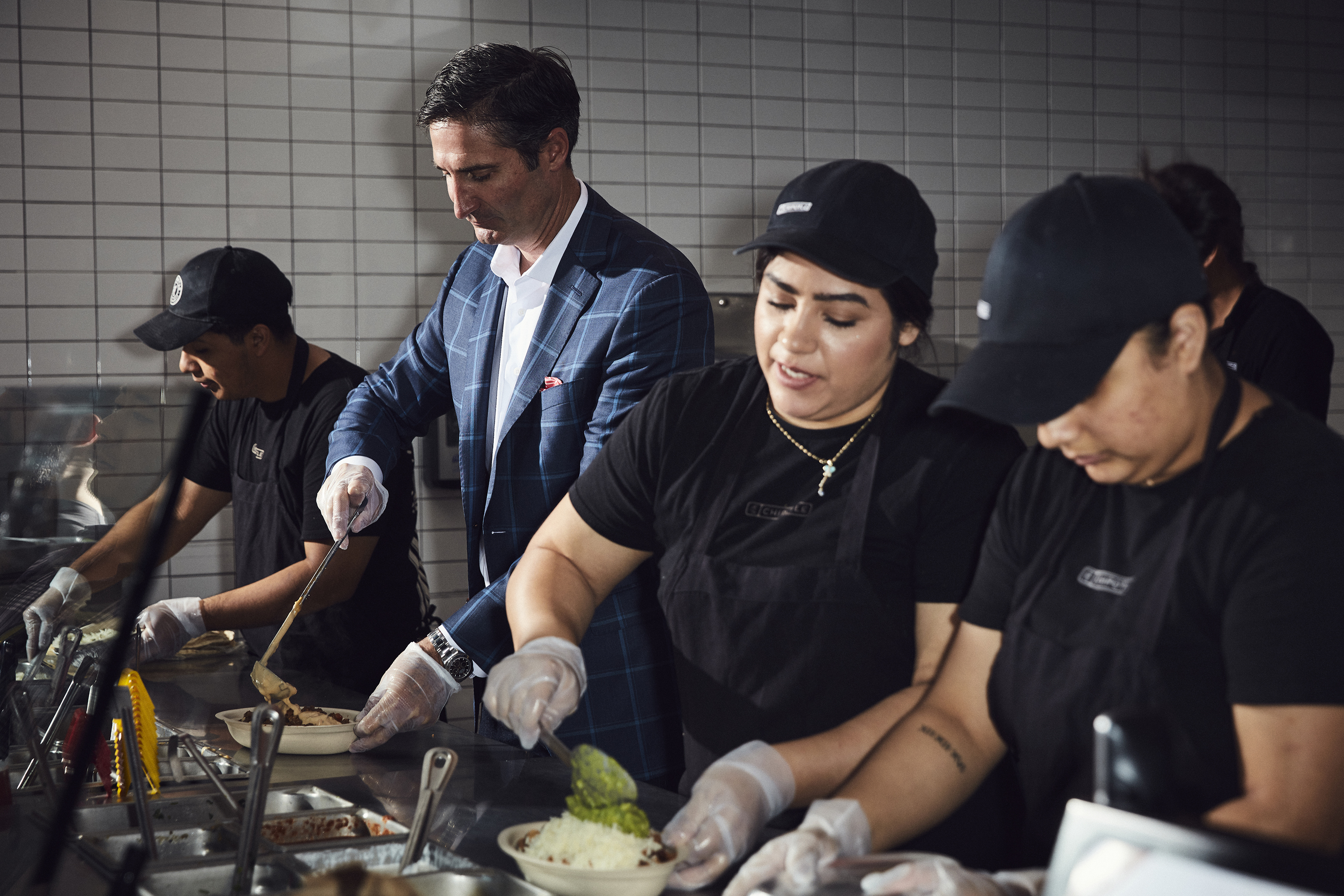The bacon quesadilla is compelling, crisp and not skimpy on the cheese. I taste it on a sunny October day in Newport Beach, Calif., where Chipotle CEO Brian Niccol is in a restaurant that doubles as a test kitchen, serving up some of the new items the fast-casual chain may soon offer. Possibilities include quesadillas, nachos, hibiscus lemonade, even avocado tostadas—an item designed to be on brand for any millennial who has dreamed of eco-snorkeling in the Sea of Cortez. But Niccol has plans for the company that go well beyond jazzing up the menu.
Chipotle Mexican Grill was once the envy of entrepreneurs everywhere. Founded in 1993 by a classically trained chef, it grew from a single location in Denver into a billion-dollar burrito empire by 2006, the year the company went public. Its formula embraced the best of fast food (low prices, quick service, big portions) while positioning the company as the industry’s antithesis, with fresh ingredients and a corporate ethos that emphasized integrity and sustainability. New locations popped up across the U.S. as the company’s stock price soared more than 3,000% in the decade after its IPO. At the peak of 2015, 1.5 million people ate at Chipotle every day.
Then came the meltdown. In August 2015, Chipotle customers were sickened by norovirus in California and salmonella in Minnesota. That was followed by a high-profile outbreak of E. coli that October that was linked to Chipotle locations in Washington State and Oregon, and then another norovirus incident in Boston. In total, about 500 people reported getting sick, and the string of food-safety issues sent the company’s stock plummeting from a high of more than $750 to under $400. Sales slumped by nearly one-third. As the company tried to bounce back in ensuing years, more problems followed. Federal consumer-protection watchdogs launched an investigation. (The case is ongoing.) Adding to the bad press, Chipotle’s then marketing chief was placed on leave after being indicted for drug possession.
Niccol, who had been running Taco Bell, took over in March 2018 to execute a turnaround. Chipotle’s promise to sell burritos “with integrity” remains the central premise. “The things that make us unique, we’re quadrupling down on that,” he says. A new management team is also in the midst of experiments designed to lure consumers new and old, from a customer-loyalty program to beefed-up delivery options. But changes will come slowly. Niccol intends to innovate without compromising the simplicity that’s been fundamental to the chain’s appeal.
The larger vision, he says, is to make the company a lifestyle brand known for making healthful eating available to the masses. His dream is to see Chipotle mentioned not alongside industry competitors like Panera Bread but with brands like Patagonia, whose expensive fleeces signal environmental consciousness. “If that’s the company we keep,” he says, “we’ll become more and more integrated in people’s lives.”
Recapturing the magic Chipotle once had won’t be easy. The memory of food scares hasn’t faded. And thanks in part to Chipotle’s early success, consumers who want a quick, relatively healthy bite have never had more alternatives. Niccol’s goal may be no less ambitious than “reshaping food” itself. But first, he has a more basic hurdle to clear: making you love Chipotle again.
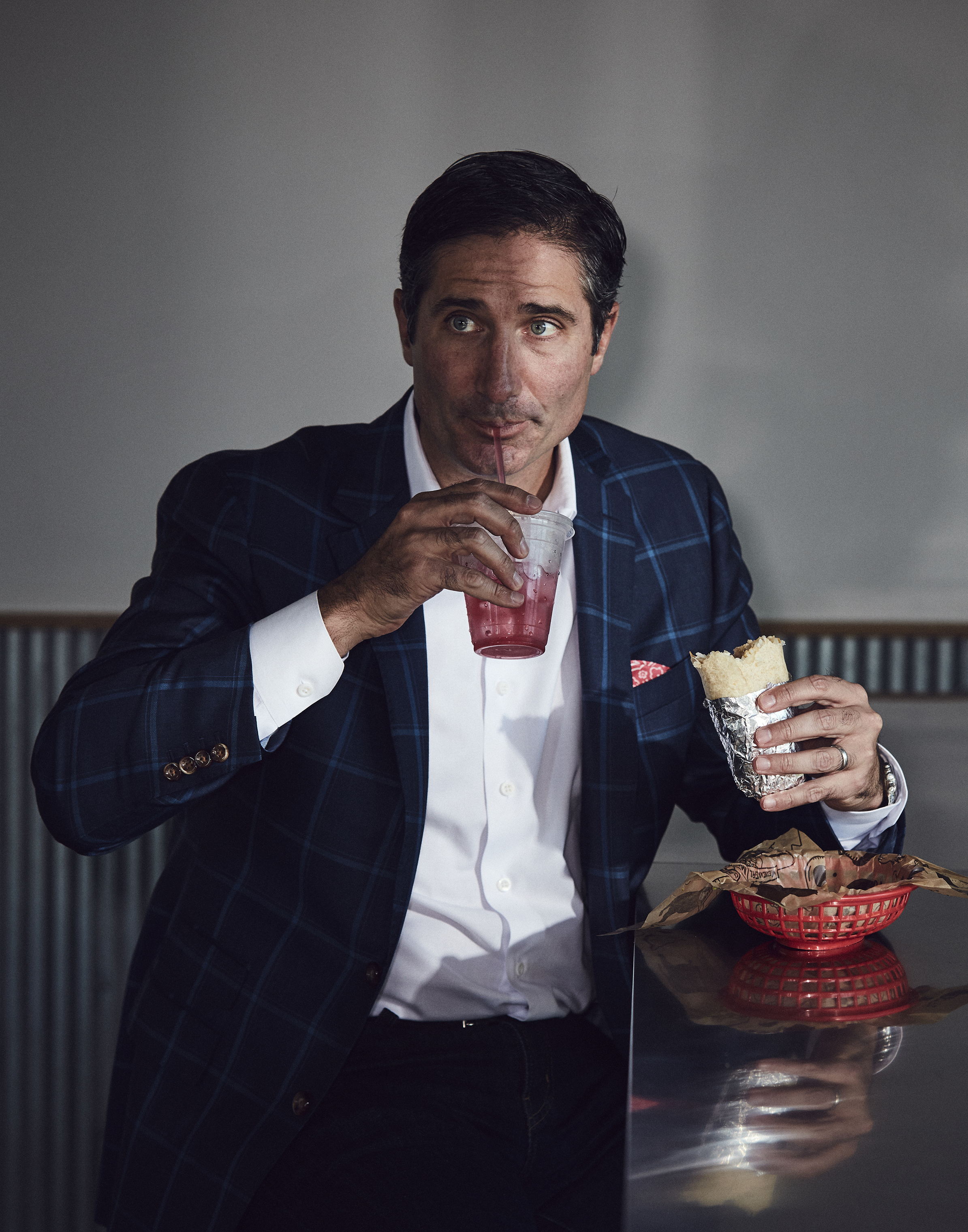
Chipotle’s new executive team likes to describe the business as a startup, and although it is not, the new corporate headquarters in Newport Beach gives the appearance of one. Chipotle moved here from Denver after Niccol took over. While the change was convenient for the boss—Taco Bell’s HQ is in nearby Irvine—Niccol says the decision was about tapping into food culture “set on the coasts” and resetting the company culture too. “We had to relaunch,” he says. On the October morning when I visited, wires were sticking out of walls and workers perched on folding chairs. New employees were arriving for orientation, and there was a giddy buzz in the air. The conference room where I spoke with most executives was identified not by a number but by a piece of printer paper taped to the wall outside. On it was the word Sofritas, a reference to the chili-soaked tofu that was one of the few major items added to the menu before Niccol arrived.
Chipotle was founded a quarter-century ago by Steve Ells, a chef who turned out to have great intuition as an entrepreneur. At a time when megachains were fighting to offer the cheapest possible burger, Ells insisted that people wanted something else. Using traditional cooking techniques, he’d sell customizable burritos with fresh ingredients for a price closer to $10 and assemble them right in front of customers. Chipotle’s runaway success—it grew from one store to 500 at the time of its IPO and now has 2,450—has led people like restaurant-industry consultant Aaron Allen to liken Ells to Henry Ford. The model proved that customers would pay more for better ingredients, a discovery that helped give rise to other fast-casual chains like Sweetgreen and Lemonade that serve up salads and grain bowls in similar fashion. “Fresh became the most bankable word in food service,” Allen says.
Chipotle’s dizzying rise was all the more remarkable given the things Ells didn’t do. There was no breakfast. The menu rarely changed. Instead of running national TV ads, Chipotle did things like commission Toni Morrison to write poetry for its to-go bags. Two top executives were Ells’ college buddies. “People who were doing those jobs didn’t really have any long tenure or expertise in them,” says Sara Senatore, a senior analyst with Sanford C. Bernstein. That was fine on the way up but became a liability once things went sideways.
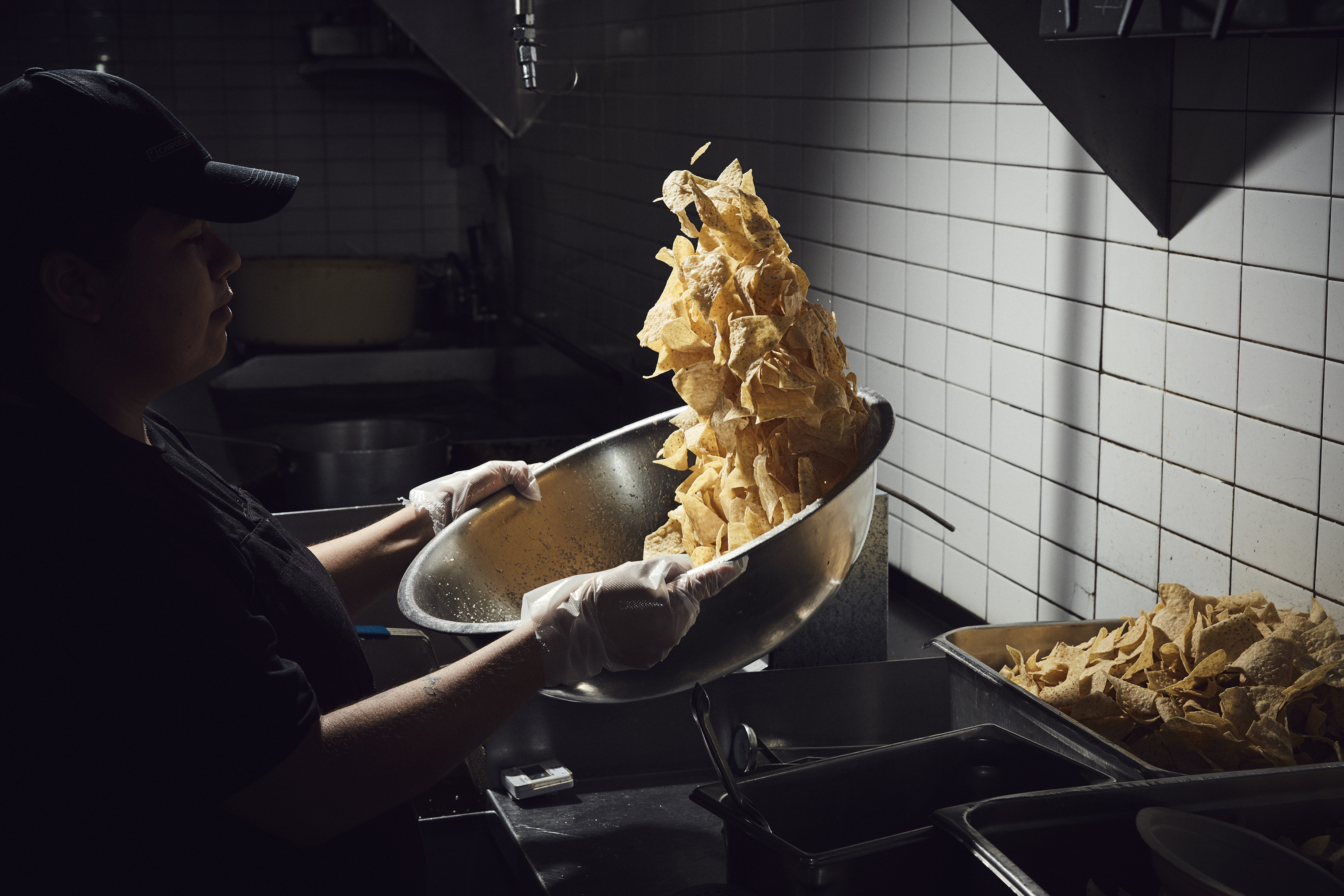
Chipotle’s habit of preaching about its methods didn’t help either. The firm not only worked to use natural ingredients; it also produced short films that wagged a finger at anyone who engaged in factory farming. “We spent too much time talking about other people doing wrong and not enough time talking about what we were doing to change food culture,” Niccol says. New chief marketing officer Chris Brandt suggests another element: “There’s nothing like success to make you a target.”
Whatever the reason, food-safety problems at Chipotle seemed to receive outsize scrutiny compared with industry peers. While E. coli outbreaks are rare, norovirus is relatively common and incidents can be caused by a single sick customer or employee rather than lax safety standards. Fair or not, media coverage of the issues sent a message to consumers that Chipotle was unsafe. “It is really all about perception,” says David Tarantino, a senior analyst at Baird. “And consumers were perceiving that Chipotle was getting people sick randomly for an extended period of time.”
The company took pains to show it was serious about protocol, shutting down every restaurant one day in 2016 for a company-wide safety briefing and putting all 70,000 employees through a new training program after a July 2017 norovirus outbreak in Sterling, Va. But morale was dismal. “People felt beaten and downtrodden,” says chief restaurant officer Scott Boatwright, who came to Chipotle from Arby’s about a year before Niccol arrived.
In November 2017, Ells announced that he would be stepping down as CEO. (He remains chairman of the board.) Among investors, “patience was running out,” says chief financial officer Jack Hartung. The day after Chipotle announced that Niccol would take over, the stock price jumped 15%. In some quarters, the appointment also sparked fears. Taco Bell is known more for its low price points than for the freshness of its ingredients. Hartung says he received a series of texts from friends with messages like “Don’t let him change the food.”
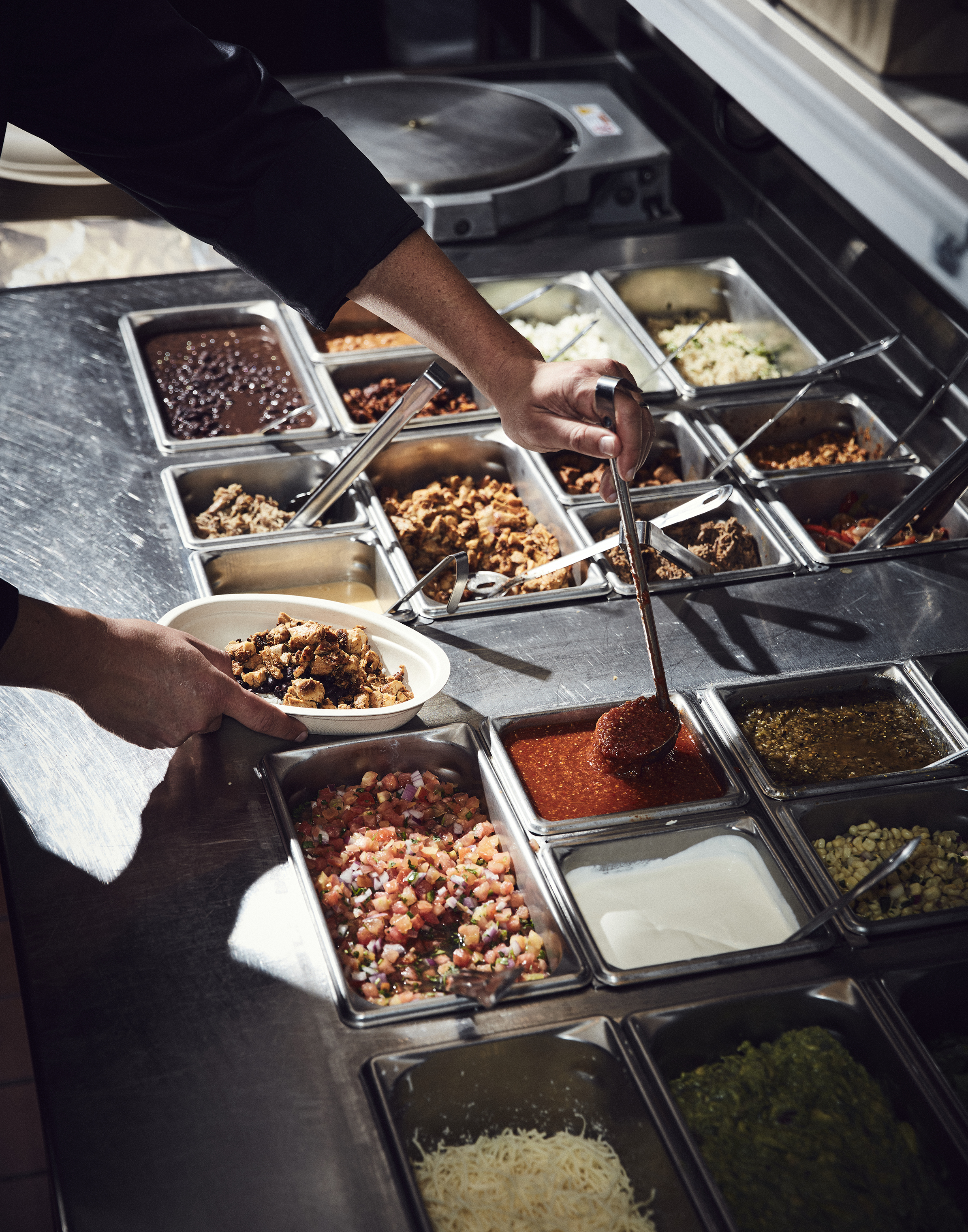
As compelling as bacon quesadillas may be, the menu is just one piece of Niccol’s plan. The new CEO is a marketing guru, not a chef. After college he worked at Procter & Gamble, finding new ways to get people to buy big-name brands like Scope and Pringles. (Snack Stacks, anyone?) Then he moved to Yum! Brands in 2005, working his way up at Pizza Hut—where he had the foresight to realize that customers would want to order pizza online—before moving to Taco Bell. With him at Chipotle is a new crew of corporate veterans who hail from places like Starbucks, infusing the firm with a level of professionalism that many say it lacked. “When I got here, no projects ever ended,” Niccol says.
If there is one term that embodies Chipotle’s new chapter, it may be stage-gate. In interviews, almost every executive mentions this method of innovating, which involves trying things out on a very small scale (one location), then a slightly larger one (seven or eight) and so on, before you even think about rolling out a change to the entire system. Along the way, you refine the hypothesis. Queso is an example, Niccol says, of why this is a must. Consumers derided the melted cheese as “gritty” when Chipotle debuted it in the fall of 2017. The company is now on its third iteration, the kind of tweaking that Niccol believes should have happened long before it debuted.
The team is working on a range of initiatives that have emerged from extensive consumer research. If Ells attracted customers by giving them something they didn’t know they wanted, Niccol is determined to do so by giving them what they ask for—or at least some of those things.
Customers say they want nachos and quesadillas on the menu, so Chipotle is experimenting with recipes. A loyalty program, another frequent request, is being tested at about 150 locations. By the end of 2019, most restaurants will have “digital pickup shelves” where people can pop in and grab the tacos they preordered without waiting in line. Some restaurants are even trying out “digital drive-throughs,” windows that eliminate the need to leave the car (though you still have to order ahead). There are murmurs about offering breakfast, though Niccol says that’s not happening anytime soon. And the company has tried out $2 taco “happy hours” in the midafternoon.
The company is also working on sourcing its rice, beans and cilantro from organic suppliers. Improving food quality rather than saving money on ingredients is key to Niccol’s vision of turning the burrito chain into a badge of healthy living. In January, Chipotle debuted “Lifestyle Bowls” that are compatible with trendy diets like paleo, keto and Whole30. “Changing the narrative back to what people love about Chipotle” is central to reviving the brand, says Tarantino, the Baird analyst.
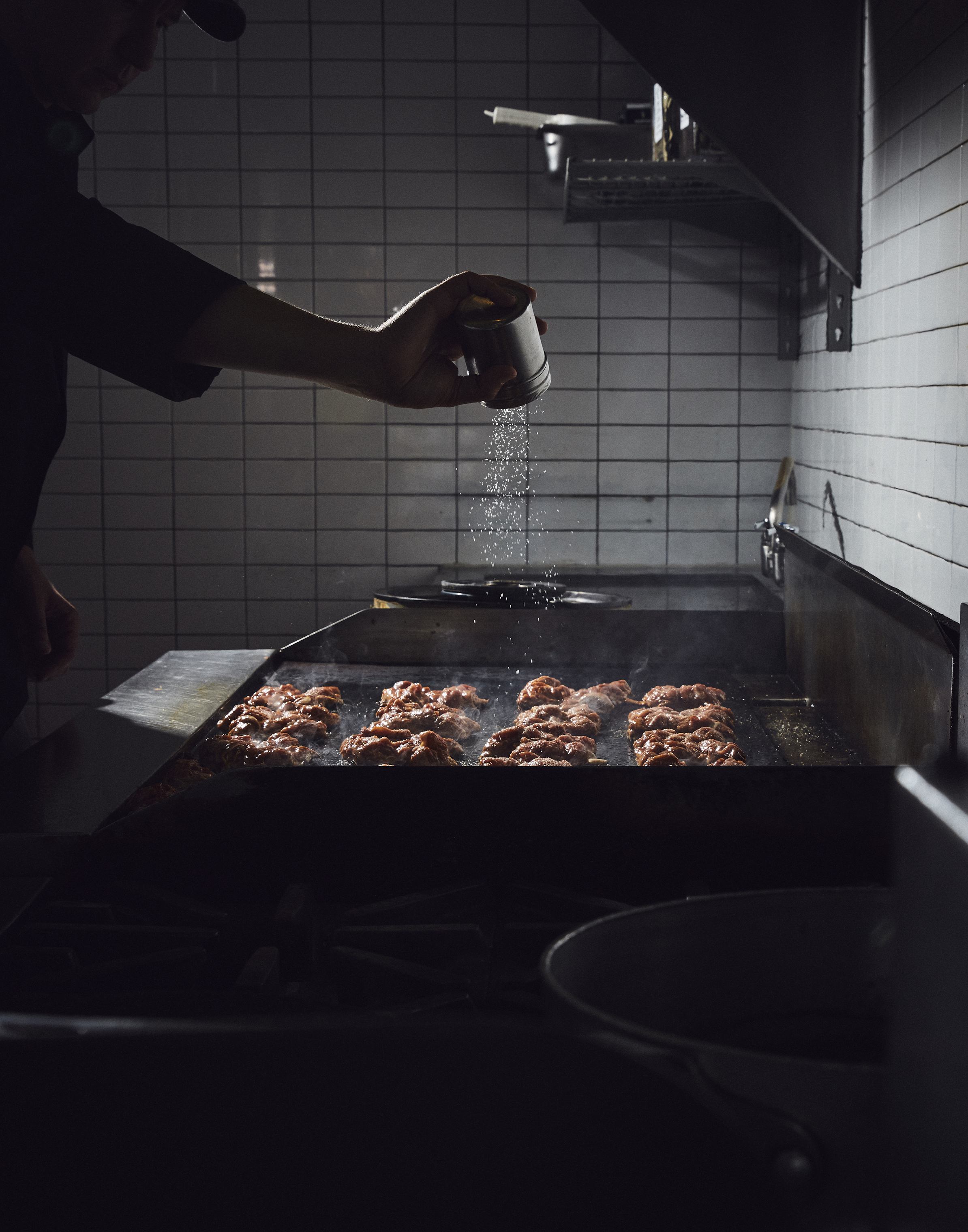
Among the initiatives that Niccol and Wall Street are most bullish on is the company’s recent “For Real” ad campaign, which highlights the 51 ingredients Chipotle uses in its food. In a break with the past, the company is doing things like running national TV ads during football games and launching “stickers” on Snapchat. “Chipotle didn’t have to do advertising for so long because they’d build a restaurant and people would come,” Brandt says. “But the level of competition has changed. The world has changed.”
Overall the stock is up more than 60% since Niccol took the reins. Though restaurants aren’t as busy as they once were, the company is expanding and is on track to open a new location every couple of days in 2019. It will take time to restore the love. “When you lose that much traffic that quickly in a restaurant, people don’t just come running back,” says John Glass, an equity analyst with Morgan Stanley. “They go find other places to eat. So then they’ve got new habits, and you’ve got to get them back in some way.”
When it comes to food safety, Chipotle will also have to deal with a level of scrutiny others don’t. It quickly became national news when customers reported getting sick after eating at Chipotle in Ohio this past summer. But the attention is O.K., Niccol says, because it’s also national news when Chipotle gives away free burritos. And that’s the affection he’s counting on.
“When good things happen, we probably get more than our fair share. And when unfortunate things happen, we probably get more than our fair share,” he says as he sips Topo Chico mineral water, another item that may be added to menus. “The good news,” he says, “is people care.”
- The 100 Most Influential People of 2024
- How Far Trump Would Go
- Why Maternity Care Is Underpaid
- Scenes From Pro-Palestinian Encampments Across U.S. Universities
- Saving Seconds Is Better Than Hours
- Why Your Breakfast Should Start with a Vegetable
- Welcome to the Golden Age of Ryan Gosling
- Want Weekly Recs on What to Watch, Read, and More? Sign Up for Worth Your Time
